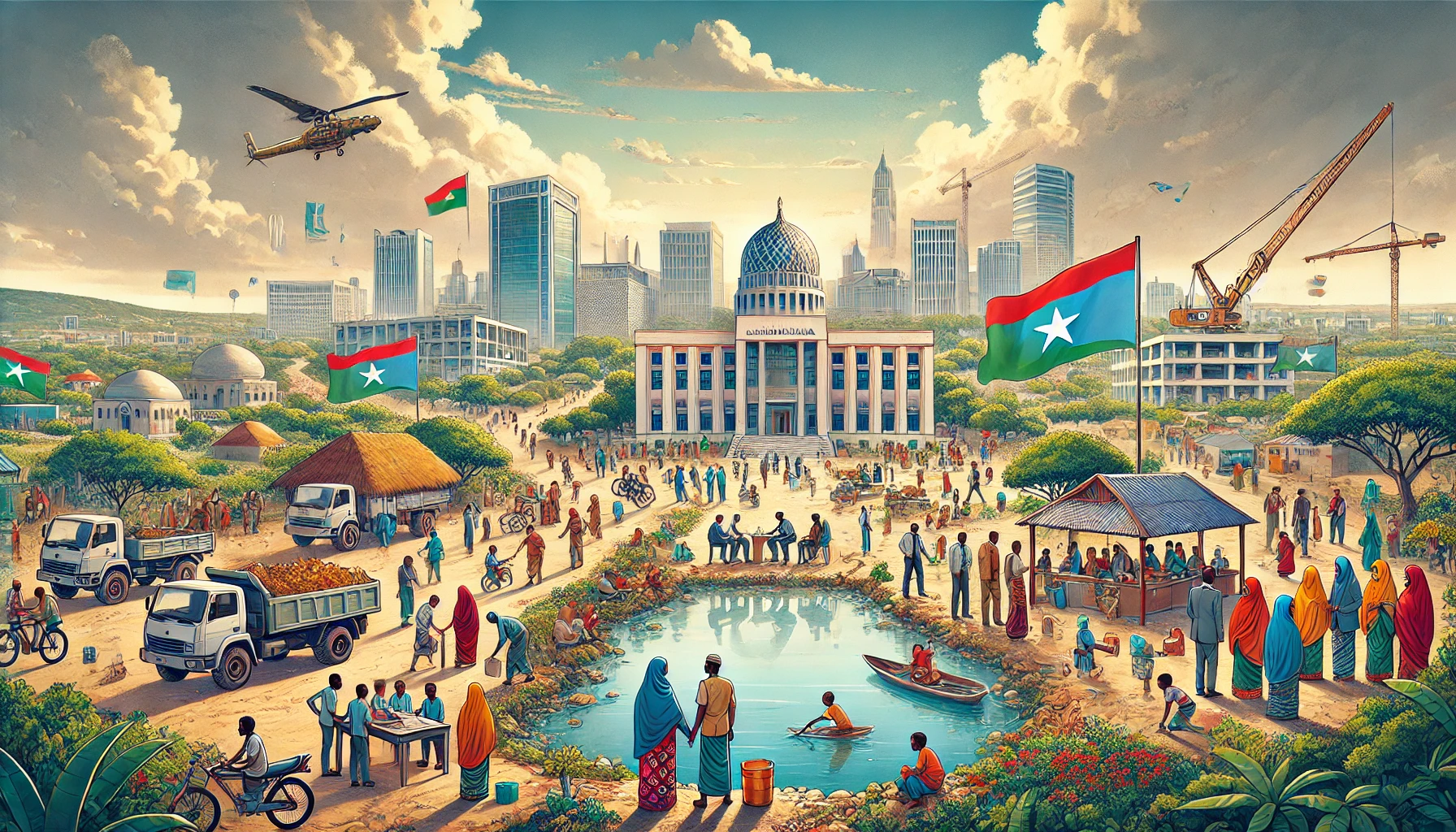Enhancing Somalia’s Social Contract Through Fiscal Reforms and Decentralized Services
The World Bank’s report highlights Somalia’s challenges in state-building, focusing on enhancing domestic revenue, improving service delivery, and fostering trust through decentralization and reforms. With limited resources and reliance on aid, Somalia must prioritize strategic governance and fiscal sustainability to strengthen its social contract.

The World Bank’s report, "Toward Building Somalia’s Social Contract," produced by its Somalia Governance team, delves into the challenges and opportunities in state-building for a nation recovering from decades of conflict and institutional collapse. Somalia remains heavily dependent on external aid, which constitutes nearly half its budget, as its domestic revenue-to-GDP ratio is the lowest globally at 2.5%. Since adopting a provisional constitution in 2012, the Federal Government of Somalia (FGS) has achieved key milestones, including progress in public financial management and tax reforms, as well as debt relief under the Heavily Indebted Poor Countries (HIPC) Initiative in 2023. However, the Somali state is still far from achieving the capacity to provide basic services, such as security, health, and education, to its population, raising questions about its legitimacy and sustainability.
Striking a Balance Between State Affordability and Citizen Expectations
One of the central challenges highlighted in the report is defining the size and role of the state within Somalia’s fiscal limitations. Current service delivery remains woefully inadequate, with public schools reaching only 6–13% of school-aged children and healthcare services covering just 20% of the population, most of which are funded and delivered by non-state actors. Expanding these services to reach a broader segment of the population is contingent upon increasing domestic revenue collection, which is projected to rise to 4.5% of GDP by 2030. This would enable modest improvements, but achieving universal coverage in health and education would require revenues to reach 14% of GDP in the long term. The report stresses the importance of clear communication between the government and its citizens to manage expectations and build trust. By demonstrating tangible improvements in public services, the state can strengthen the social contract, fostering greater public willingness to pay taxes.
The Complexities of Fiscal Federalism in Somalia
Fiscal federalism emerges as a critical theme in the report, as the division of responsibilities and revenue-sharing mechanisms between the FGS, Federal Member States (FMS), and local governments remains underdeveloped. Although financial transfers from the FGS to FMS have increased, local governments the closest level of governance to citizens are underfunded and often excluded from fiscal decision-making processes. Despite limited resources, local governments enjoy the highest levels of citizen trust, making them well-positioned to deliver critical services, especially to vulnerable populations. The report advocates for empowering local governments through predictable intergovernmental transfers, capacity-building initiatives, and community engagement. Decentralization, when properly executed, can enhance efficiency and foster greater accountability in service delivery.
Enhancing Revenue Mobilization: A Path to Self-Sufficiency
The report identifies domestic revenue mobilization as the cornerstone of Somalia’s journey toward fiscal sustainability. Somalia’s reliance on customs revenues and a fragmented taxation system contribute to inefficiencies and low compliance rates. Businesses and large taxpayers face overlapping authorities and inconsistent enforcement, further eroding trust in the tax system. To address these challenges, the report recommends streamlining tax administration, improving audit quality, and enhancing communication between tax authorities and taxpayers. Somalia’s recent integration into the East African Community presents an opportunity to harmonize trade policies and boost revenue collection. Additionally, the country’s nascent natural resource sector holds the potential for significant revenue generation, provided there is robust regulatory oversight. Achieving these reforms requires strong political will and institutional commitment.
Building Trust Through Inclusive and Effective Service Delivery
Service delivery is a cornerstone of the social contract, and the report emphasizes its role in building trust and legitimacy. While citizens overwhelmingly prefer public facilities, they often rely on private or NGO-provided services due to accessibility and quality issues. The report suggests that Somalia adopt a collaborative approach, leveraging partnerships between public, private, and non-state actors to enhance service quality and reach. Modernizing private facilities and ensuring government oversight can help bridge service gaps and promote equity. Furthermore, the federal, state, and local governments must clearly define their respective roles in service delivery. The report highlights the importance of citizen participation, noting that feedback mechanisms and community engagement platforms significantly improve satisfaction with government services and strengthen accountability.
A Vision for Somalia’s Future
The report concludes with a vision for Somalia’s long-term development, where expanded service coverage and intermediate state functions become achievable by 2060 under optimistic growth scenarios. This vision hinges on sustained GDP growth, increased domestic revenue, and continued political stability. In the short to medium term, the government must prioritize pragmatic steps to strengthen governance, improve fiscal management, and allocate resources effectively to essential services. Key policy recommendations include decentralizing service delivery, implementing comprehensive tax reforms, and fostering partnerships with non-state actors. The report underscores that Somalia’s journey toward resilience requires not only technical reforms but also a commitment to aligning state capacity with citizen expectations, building trust, and fostering collaboration across all levels of governance. By doing so, Somalia can move closer to realizing a sustainable and inclusive social contract that reflects the aspirations of its people.
- FIRST PUBLISHED IN:
- Devdiscourse










